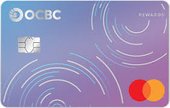What is a credit card with no minimum spend requirement?
Many of the top credit cards in Singapore require users to spend a certain amount within a specified timeframe (generally a statement period). Failure to do so typically means forfeiting rewards points and cashback that would been yours had you hit the minimum spending requirement.
However, several cards with rewards and cashback have been introduced cards that don't have a minimum spend requirement — one less thing to worry about.
What to compare for no minimum spend credit cards
- Rewards program. Some cards come with cashback rewards, rewards points, or miles (e.g. KrisFlyer miles). Choose what aligns best with your spending preferences.
- Earn rates. Not every credit card is created equally, so compare the earn rates for specific spending categories, such as dining, groceries, or online shopping. A few cards have a standard rate across all categories of spend.
- Welcome bonus. Since it's not often most people sign up for a new credit card, take the opportunity to make the most of the welcome bonus. Be clear about what you need to do in order to trigger the bonus (usually that involves spending a certain amount within a set period of time after approval).
- Redemption flexibility. Some rewards programs are more flexible than others, allowing you to convert or transfer points between programs. Amex Membership Rewards is an example, having a range of airline and hotel transfer partners. If you aren't a brand loyalist, this may be of particular interest.
- Additional benefits. Does the card come with travel insurance, airport lounge access, dining privileges, discounts, or some other perk? Make sure they align with your lifestyle and needs.
- Interest rates. While it's advisable to pay your credit card bills in full each month, be clear about what interest rate would apply in case you need to carry a balance for a month or two.
- Credit limits. Be clear on the minimum and maximum credit limits on offer. This is particularly important if you are a big spender.
- Annual fees. If there is an annual fee, can it be waived? If not, is it worth paying for the card's other benefits and perks?
- Eligibility criteria. Check that you are eligible before applying. Cards have varying minimums for income, residence status, etc.
Pros and cons
Pros
- Reliable rewards. Whether it's cashback, rewards points, air miles, or even a welcome bonus, you can enjoy the benefits regardless of how much you spend.
- Simplicity. These cards eliminate the need to keep track of minimum spend requirements and deadlines. One benefit of this is that you are not under pressure to spend money when you don't need to.
- No pressure to spend. There's no temptation to spend more than you want to just to meet a requirement.
Cons
- Potentially lower earn rates. These cards are likely to be less rewarding compared to cards with higher thresholds.
- Less attractive welcome bonuses. As is the case with the ongoing earn rate, these cards may not pay out as much for signing up.






